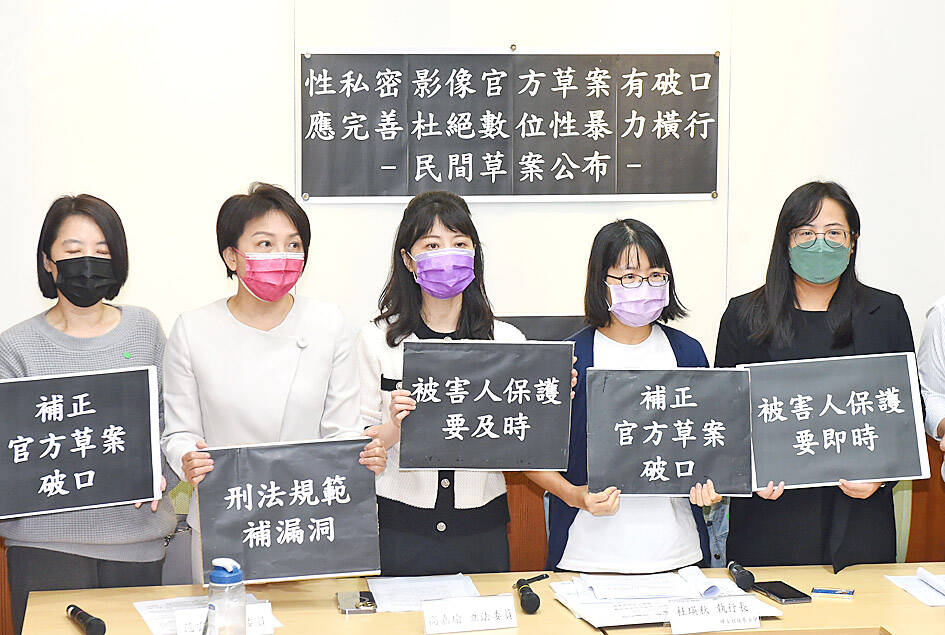Women’s rights groups and legal experts yesterday urged the government to fix loopholes in its proposed amendments to the Criminal Code and other regulations designed to punish those who produce or spread sexual material of a person without their consent.
In March, the Executive Yuan approved proposed amendments to the Criminal Code, Child and Youth Sexual Exploitation Prevention Act (兒童及少年性剝削防制條例), Crime Victim Protection Act (犯罪被害人權益保障法) and Sexual Assault Crime Prevention Act (性侵害犯罪防治法) to curb the unauthorized creation and dissemination of intimate sexual images of individuals.
The amendments were drafted after a YouTuber was arrested on suspicion of selling deepfake pornographic videos featuring more than 100 public figures and the “Nth Room” case in South Korea, in which a person spread sexually exploitative content using the Telegram app from 2018 to 2020.

Photo: Liu Hsin-te, Taipei Times
Representatives from the Taipei Women’s Rescue Foundation, the Judicial Reform Foundation, the Garden of Hope Foundation, ECPAT Taiwan and the Women in Digital Initiative yesterday hosted a news conference to address problems with the proposed amendments.
The amendments fail to cover a broad range of crimes, leaving some victims unprotected, they said, adding that there is no mechanism to immediately remove illegally disseminated material from the Internet.
The government does not have jurisdiction over content that has already been published on online platforms based overseas, they added.
The representatives proposed their own version of the amendments, which would require illegally disseminated content of an intimate nature to be taken down within 24 hours.
The district court could issue a restraining order asking perpetrators to submit, delete, destroy or remove the content, they said.
Representatives proposed that perpetrators who intend to frighten victims by threatening to disseminate intimate content through digital or non-digital means be sentenced to six months to three years in prison and fined no more than NT$30,000.
Perpetrators should be sentenced to six months to five years in prison for using sexual content to demand reconciliation or sexual favors, or to impede victims from exercising their rights, they said.
Those who blackmail victims for monetary gain should face jail time of six months to seven years, and a NT$50,000 fine, they said.
Democratic Progressive Party (DPP) Legislator Kao Chia-yu(高嘉瑜), a survivor of domestic violence, said that intimate photos taken by her ex-boyfriend with her consent were later used to threaten her, even though they were not disseminated.
However, the government’s proposed amendments fail to take this situation into account, she said.
She said that although her case involved online gender-based violence, perpetrators of similar crimes can only be sentenced to no more than two years in prison for committing a crime of intimidation.
Removal of online material is only enforced in cases involving offenses against privacy or the distribution of obscene material, Kao said.
The Sexual Assault Crime Prevention Act does not address online gender-based violence, and the government has yet to consolidate opinions on the protective measures and counseling available to victims, she said.
“I am willing to exchange views with civic groups to address the current regulations’ shortfalls,” she said.
DPP Legislator Fan Yun (范雲) said that political party caucuses are in the final stages of negotiating the bills.
“We hope that the Legislative Yuan and the Executive Yuan can work together and ensure that the amendments are well-rounded,” she said.

Taiwan is stepping up plans to create self-sufficient supply chains for combat drones and increase foreign orders from the US to counter China’s numerical superiority, a defense official said on Saturday. Commenting on condition of anonymity, the official said the nation’s armed forces are in agreement with US Admiral Samuel Paparo’s assessment that Taiwan’s military must be prepared to turn the nation’s waters into a “hellscape” for the Chinese People’s Liberation Army (PLA). Paparo, the commander of the US Indo-Pacific Command, reiterated the concept during a Congressional hearing in Washington on Wednesday. He first coined the term in a security conference last

Prosecutors today declined to say who was questioned regarding alleged forgery on petitions to recall Democratic Progressive Party (DPP) legislators, after Chinese-language media earlier reported that members of the Chinese Nationalist Party (KMT) Youth League were brought in for questioning. The Ministry of Justice Investigation Bureau confirmed that two people had been questioned, but did not disclose any further information about the ongoing investigation. KMT Youth League members Lee Hsiao-liang (李孝亮) and Liu Szu-yin (劉思吟) — who are leading the effort to recall DPP caucus chief executive Rosalia Wu (吳思瑤) and Legislator Wu Pei-yi (吳沛憶) — both posted on Facebook saying: “I

The Ministry of Economic Affairs has fined Taobao NT$1.2 million (US$36,912) for advertisements that exceed its approved business scope, requiring the Chinese e-commerce platform to make corrections in the first half of this year or its license may be revoked. Lawmakers have called for stricter enforcement of Chinese e-commerce platforms and measures to prevent China from laundering its goods through Taiwan in response to US President Donald Trump’s heavy tariffs on China. The Legislative Yuan’s Finance Committee met today to discuss policies to prevent China from dumping goods in Taiwan, inviting government agencies to report. Democratic Progressive Party Legislator Kuo Kuo-wen (郭國文) said

Sung Chien-liang (宋建樑), who led efforts to recall Democratic Progressive Party (DPP) Legislator Lee Kun-cheng (李坤城), was released on bail of NT$80,000 today amid outcry over his decision to wear a Nazi armband to questioning the night before. Sung arrived at the New Taipei District Prosecutors’ Office for questioning in a recall petition forgery case last night wearing a red armband bearing a swastika, carrying a copy of Adolf Hitler’s Mein Kampf and giving a Nazi salute. Sung left the building at 1:15am without the armband and covering the book with his coat. Lee said today that this is a serious